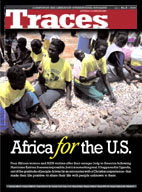
Traces N.11, December 2005
A Proposal for Facing RealityWhat do a famous singer like Mina and one of the many mothers of Rome have in common? They both responded in the same way to the appeal launched in mid-November by more than fifty figures from the Italian worlds of culture and economy: “If there were an education of the people, everyone would live better.” People from both sectors felt drawn into action, involved, and ask that the appeal not remain just that.
It’s happening like this. Some are writing newspaper articles, others are sending e-mails to radio programs or calling friends. In reaction to the appeal, there is a stirring that reveals an Italy that is worried, but also desirous of commitment with the future. Education. Fr. Giussani spent his life on this word and the value of its real content. He understood a fact, perceiving what intellectuals, bishops, and philosophers would later see for themselves: the future of a people has everything to do with education. If an adequate one is not proposed, it is inevitable that society–especially in times of greater harshness or conflict–runs the risk of dissolution. Today we are living such a moment.
Conflicts, evident or insidious, can be faced adequately if the life of men and women is constantly educated to a positive concept of existence. This concept cannot be based on mere optimistic voluntarism. Either it is sustained by a historically ascertainable event as the source of continuous hope, or it will not hold. The historic event that possesses this characteristic of re-founding the hope of men is Jesus Christ, whose birth we will celebrate shortly, at Christmas. This positive concept of existence is demonstrated by the private stories of a host of men and women throughout the centuries, and the presence of a civilization that, animated by the Christian faith, has continued to promote the development, well being, and dignity of each life. This history, which we call “tradition,” is what must be proposed as the working hypothesis for facing reality.
Today, all of this is the target of many attacks and of internal corrosion.
For this reason, it is more urgent to propose education as a common problem, not just for school children, but for everyone in our society. While many, too many of whom occupy positions of responsibility, seem distracted by ensuring a small future for themselves or their factions, there is a people of mothers, fathers, exponents of culture, workers of all kinds, who are raising another flag, not the banner of a part. But everyone can decide for themselves whether they want to join this call.
Education is not a word indicating an abstract subject. It is not just a topic of debate. It indicates a concrete, existential, and lived process; it engages the freedom of those who propose it and the freedom of those who are challenged to respond. Thus, you are really not talking about education if you don’t propose an educational journey, if you don’t take the risk of making a proposal–as Fr. Giussani did.